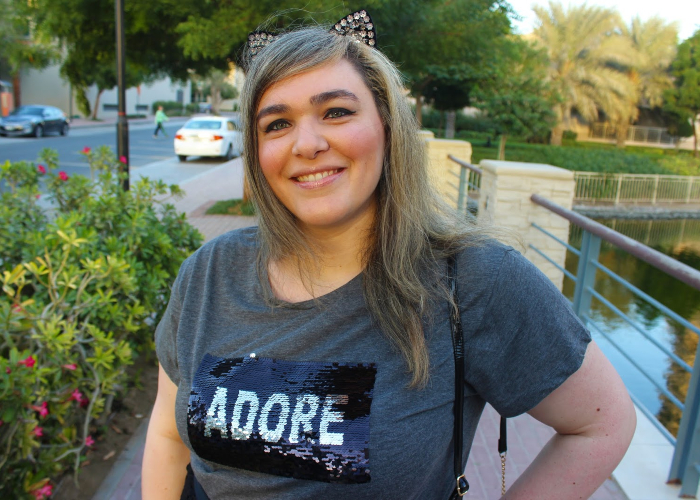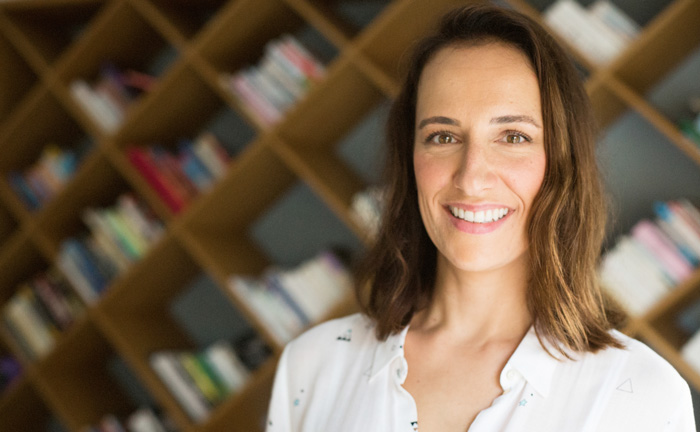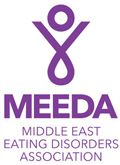When I started my coaching practice last year, one of its foundations was social justice. But it’s a goal that is obviously tainted by my own privileges as a thin, white, middle class, cisgender individual. Therefore, one of my ongoing projects with this blog and as I grow my practice, is to dedicate more time to listen, to explore, to understand other people’s life experiences, outside of my own personal filters. As I am going through my 12th ramadan living in the UAE, this time as a coach, it felt really pressing to look at ramadan from an ‘insider’s’ perspective, and considering what it meant for muslims who might experience a challenging relationship with food and body.
So, I have invited plus size fashion blogger and body positive activist Hanane Fathallah to answer some of my most burning questions about ramadan. And, thankfully, she said yes! Hanane (pronounced with a silent “e”) is 35 and lives in Dubai. She is a stay-at-home mom, who cares for her beautiful son with autism, Ahmad. She is also a plus size fashion blogger and a freelance graphic designer. She started blogging in 2012, as a way to escape from her daily routine, but also to write about her experience with motherhood and autism, and to advocate for plus size fashion & body positivity through outfit posts and personal stories. She is empowering plus size women in the Middle East to stand in their power through fashion, which I absolutely love and find so important.
What does the Holy Month mean to you specifically?
Growing up in Saudi Arabia, Ramadan has always had a special place in my heart. You feel the true essence of the Holy Month, you understand the meaning of giving and you reflect on your blessings. It is a month of kindness, hope, giving and reflection. It is also the time to multiply your good deeds, in honesty and modesty. Ramadan holds so many memories, from sharing iftars [meal eaten as sunset during ramadan] with our big families to wearing our traditional embroidered abayas [simple, loose over-garment, essentially a robe-like dress, worn by some women in parts of the Muslim world]. Above all, it is a month of prayer, bringing muslims closer to Allah. Fasting cleanses the mind and body, and this is definitely the best quality of this blessed period.

On here, I talk a lot about honouring your body’s needs and listening carefully to its cues, especially for people that have typically been stuck into chronic dieting and denying a lot of their basic food needs. To me, this is also what body positivity is about, which I know you are a strong advocate of, here in the Middle East. How does one achieve the delicate balancing act of listening to their bodies & honouring their needs while celebrating ramadan?
I think whatever routine you apply to your daily life (outside of the Ramadan period) can easily be adapted to Ramadan. The blessed month should never be taken as a burden, but rather a blessing. If you think about it, it actually encourages us to be more in tune with our body and soul. Sometimes, with joy and family gatherings comes food – a lot of it. Depending on your needs and goals, you should plan your iftar as well as your snacks and meals between Maghrib [prayer just after sunset] until Fajr [dawn prayer, marking the start of fasting for the day during ramadan], without depriving yourself or overdoing it.
Make Ramadan YOUR RAMADAN
In terms of physical activity, some people are comfortable working out during fasting or during the last two hours before iftar. Others prefer to exercise after iftar. You should follow your instinct, be realistic and kind to yourself. Never pressure yourself: do what makes you the most comfortable.
On another note, I’d like to briefly mention the notion of food. Many fasting families will make a big deal around food during this month. Supermarkets shelves empty fast: in some cases, it is in the aim to help the needy (which is honorable) but in other cases – which is more common – modest families stock up on food, as if the end of the world was near. I would rather advise to take it day by day, or at least week by week – just like you would do during the rest of the year.
So above all, you can still include your habits within the blessed month; it is all a matter of good planning, embracing Ramadan and nurturing your mind, body and soul.
What are some of your coping strategies to address the ‘diet culture’ messages referred to during ramadan (ie comparing religious fasting to a diet), especially when meeting other muslims, who might not be size inclusive, during celebrations?
It is weird, just before Ramadan even started, I had already spotted Youtube videos featuring female influencers talking about how NOT to gain weight during Ramadan. Honestly, there is nothing wrong with that, except for the intention behind it. Sometimes I feel like it is driven by social pressure. A lot of young women listen to these influencers and their message can come across as judgmental, rather than compassionate advice. Seeing this tends to make me cringe for the women who already struggle with their body image and might be a captive audience for these videos, pushing them deeper into self-hate.
My advice is not to listen to what people tell you and pretend to be advising you but rather listen to your own body. Ramadan is a beautiful way to regain balance, especially for your body. It is a religious fasting, one of the pillars of Islam, and if done properly and mindfully, it naturally works as a detox. I don’t like it when people automatically qualify Ramadan as a great means to lose weight, subcategorizing it under “diet culture”.
As a big girl my entire life, I was always observed and scrutinized by some family members, during iftar gatherings, as they shamelessly wait for the effect of Ramadan to show on my figure, and then they would bluntly congratulate me on losing weight or advise me to cut down on the sweets and fried sambousek [small meat pie]. I was honest towards my needs.
People never stop [judging]. Move away from that and focus on just being yourself.
People forget that we all evolve, throughout our life. I would advise to embrace your body, your needs, your goals, your health and construct your own understanding of how you would like to spend Ramadan, with all its blessings. Ignore the comments, just like any other day of the year.
The general recommendation for people in recovery from eating disorders/disordered eating is not to fast until their recovery is well established. What are some non-food related ramadan practices that one can do if they are unable to fast for health reasons?
I have had some years when I could not fulfill all my fasting days, especially after having my son Ahmad, who is 8 years old now and on the autism spectrum. I used to feel embarrassed at first, but eventually I embraced it as I knew that I needed to take care of my son and I needed to keep my anxiety at a low level. He is homeschooled so my energy levels needs to stay high enough for me to perform all my daily tasks.
Allah is kind and merciful, and I am positive that those who are unable to fast for health reasons are rewarded for their good deeds and investing time in prayer, in making duas [a prayer of supplication or request], in helping those in need, in volunteering, in distributing Iftar meals, and in any acts of goodness and kindness. Personally, as both my husband and I spent our childhood in Saudi Arabia, our upbringing was quite similar. We are used these local customs, to the beauty of giving, even throughout the year, not just during Ramadan. Kindness is a strength and power that many people mistake for weakness.True kindness is understood by those who are always aware of their surroundings and of [the needs of] others.
What has motherhood taught you about your faith and your body? I am guessing ramadan is very different once you have a child/children?
My faith grows stronger everyday, especially since I became a mom. The miracle of birth, the beauty of motherhood, the undying art of patience, the unconditional love you give to your children, all of these are true blessings. Ramadan is a time to reflect, a time to be grateful and kind, a time to give back and to ask the right questions. Being an autism mom has brought so many new challenges but also so much joy and so many blessings. The Holy Month creates that pause button where everything slows down, yet our reflections and prayers grow stronger and more powerful. So as Muslims, we should make the most of this blessed month by doing acts of worship and righteous deeds, and giving up bad deeds, in the hope that Allah will bless us by accepting those deeds and multiplying the rewards.
Thank you so much Hanane for casting a light onto so many of the questions I had always been afraid to ask! You can follow Hanane on Instagram through @middleeastplussizecollective or @curvynounzie.




